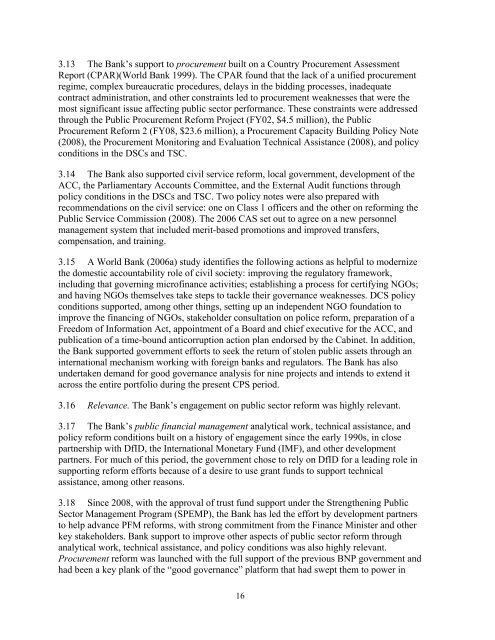Bangladesh - Independent Evaluation Group - World Bank
Bangladesh - Independent Evaluation Group - World Bank
Bangladesh - Independent Evaluation Group - World Bank
Create successful ePaper yourself
Turn your PDF publications into a flip-book with our unique Google optimized e-Paper software.
3.13 The <strong>Bank</strong>’s support to procurement built on a Country Procurement Assessment<br />
Report (CPAR)(<strong>World</strong> <strong>Bank</strong> 1999). The CPAR found that the lack of a unified procurement<br />
regime, complex bureaucratic procedures, delays in the bidding processes, inadequate<br />
contract administration, and other constraints led to procurement weaknesses that were the<br />
most significant issue affecting public sector performance. These constraints were addressed<br />
through the Public Procurement Reform Project (FY02, $4.5 million), the Public<br />
Procurement Reform 2 (FY08, $23.6 million), a Procurement Capacity Building Policy Note<br />
(2008), the Procurement Monitoring and <strong>Evaluation</strong> Technical Assistance (2008), and policy<br />
conditions in the DSCs and TSC.<br />
3.14 The <strong>Bank</strong> also supported civil service reform, local government, development of the<br />
ACC, the Parliamentary Accounts Committee, and the External Audit functions through<br />
policy conditions in the DSCs and TSC. Two policy notes were also prepared with<br />
recommendations on the civil service: one on Class 1 officers and the other on reforming the<br />
Public Service Commission (2008). The 2006 CAS set out to agree on a new personnel<br />
management system that included merit-based promotions and improved transfers,<br />
compensation, and training.<br />
3.15 A <strong>World</strong> <strong>Bank</strong> (2006a) study identifies the following actions as helpful to modernize<br />
the domestic accountability role of civil society: improving the regulatory framework,<br />
including that governing microfinance activities; establishing a process for certifying NGOs;<br />
and having NGOs themselves take steps to tackle their governance weaknesses. DCS policy<br />
conditions supported, among other things, setting up an independent NGO foundation to<br />
improve the financing of NGOs, stakeholder consultation on police reform, preparation of a<br />
Freedom of Information Act, appointment of a Board and chief executive for the ACC, and<br />
publication of a time-bound anticorruption action plan endorsed by the Cabinet. In addition,<br />
the <strong>Bank</strong> supported government efforts to seek the return of stolen public assets through an<br />
international mechanism working with foreign banks and regulators. The <strong>Bank</strong> has also<br />
undertaken demand for good governance analysis for nine projects and intends to extend it<br />
across the entire portfolio during the present CPS period.<br />
3.16 Relevance. The <strong>Bank</strong>’s engagement on public sector reform was highly relevant.<br />
3.17 The <strong>Bank</strong>’s public financial management analytical work, technical assistance, and<br />
policy reform conditions built on a history of engagement since the early 1990s, in close<br />
partnership with DfID, the International Monetary Fund (IMF), and other development<br />
partners. For much of this period, the government chose to rely on DfID for a leading role in<br />
supporting reform efforts because of a desire to use grant funds to support technical<br />
assistance, among other reasons.<br />
3.18 Since 2008, with the approval of trust fund support under the Strengthening Public<br />
Sector Management Program (SPEMP), the <strong>Bank</strong> has led the effort by development partners<br />
to help advance PFM reforms, with strong commitment from the Finance Minister and other<br />
key stakeholders. <strong>Bank</strong> support to improve other aspects of public sector reform through<br />
analytical work, technical assistance, and policy conditions was also highly relevant.<br />
Procurement reform was launched with the full support of the previous BNP government and<br />
had been a key plank of the “good governance” platform that had swept them to power in<br />
16

















